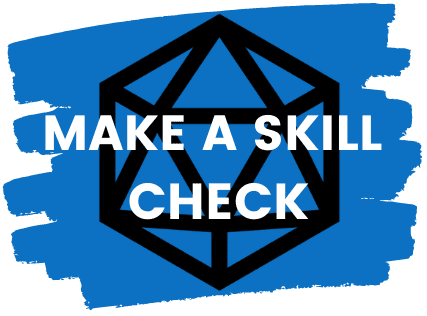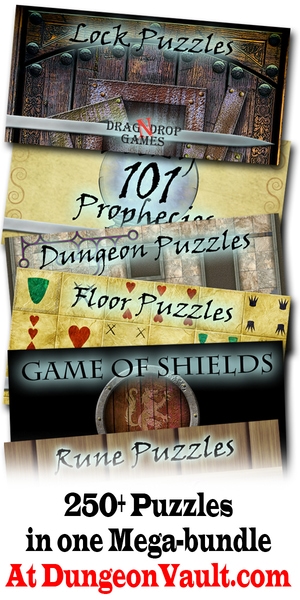On the go? Listen to the audio version of the article here:
As a Dungeon Master (DM), it may not always be clear when to give advantage, as many situations aren’t covered by the Player’s Handbook or Dungeon Master’s Guide. Some believe you should strictly adhere to the rules-as-written (RAW), while others like to sprinkle them throughout gameplay. What should you do?
Advantage is when an action is given two chances to succeed by rolling twice and using the higher number, often through a spell, ability, or item. It is one way a DM can help players and can be used to reward players’ creativity and roleplaying. Use it sparingly to encourage good behavior.
While there is a wide array of rules from skills, spells, traits, and more, which detail what advantage they give to players, there are many situations when advantage may be applied outside of what the core rules say.
This article will outline some more obscure times advantage may be applied through optional rules or the ever-so-awesome Rule of Cool.

Table of Contents
When to Give Advantage in Combat
In combat, there can be many spells, items, skills, and effects that give advantage. Some of these are core rules (e.g., attacking a blind, prone, or paralyzed target), while others are optional rules you can apply.
For instance, flanking is an optional rule which can be used in combat. If two players are on either side of an enemy, the flanking players gain advantage on their attack rolls, allowing them to land hits easier due to the enemy being distracted.
This can be a double-edged sword, however. If two creatures are on both sides of a player, then they can also gain advantage on attack rolls. The flanking rule can be found on page 251 of the Dungeon Master’s Guide.
Rule of Cool
Sometimes, you might also want to follow the Rule of Cool; bending the rules to allow for your players to do something awesome.
For players, it can be easy to get into a loop of continually using the same attacks or spells, generally because it is their strongest attack or simply their favorite. Personally, I enjoy encouraging players to be more creative.
For example, placing an immovable rod, then shoving a monster toward it, causing them to trip into a river of lava. This wouldn’t be a typical action, and it has no guarantee of working, but the player is attempting an unusual approach to the problem.
In this example, consider giving them advantage on an acrobatics or dexterity check to place the rod, and an athletics check to push the monster over. Combat will become much more exciting if your players understand that spamming their most powerful attack isn’t always the most effective.
Sessions grow stale when everyone is merely gaming the mechanics.
Looking to challenge your players?
Puzzles and Riddles can be tricky! Too easy and they’re pointless; Too hard and it’s pure frustration. What is a DM to do?
Well, our friends over at Dungeon Vault have an assortment of puzzles, riddles, and tokens to enhance your gaming experience. They even have a murder mystery and a political intrigue system!
For easy-to-use resources for any D&D game, check out the selections at Dungeon Vault!
Skill Checks
Skill checks don’t need to be a chore merely preventing heroes from reaching their MacGuffin.
Instead, encourage them to come up with unique ways of getting past guards by charming or persuading them, or perhaps by lassoing a statue and pulling it down to cross a chasm. These can be great opportunities to reward your players by giving them advantage on the related checks.
A great way to encourage out-of-the-box thinking is multi-stage obstacles. While some players may unthinkingly spend a 2nd-level spell slot to Misty Step, most would hesitate to continue burning through them outside of combat.
Suppose you have a chasm with spikes at the bottom and swinging blades hanging from the ceiling. If they successfully time their jump, they are rewarded with a greased wall. Thanks to the wall, it’s outside of Misty Step’s 30ft range.
Do the players want to chain two 2nd-level spells to reach the top? Even if they do, the blades will still stop them from throwing a rope back to help their teammates. What will they do?
Depending on how experienced your team is, you could tweak the deadliness of each trap, and you’ll be certain they’ll spend some time brainstorming before attempting it. Hell, maybe they’ll come up with something you couldn’t have possibly planned for!

Roleplaying
Alongside TTRPGs in general, roleplaying in games has become more popular in recent years. When someone commits to their role by speaking as their character, especially if it’s against their own self-interest, it’s worth considering giving them a reward.
Suppose a player is extracting information from a drunk tavern patron; if the player roleplays a conversation, particularly an engaging one, giving them an advantage on persuasion checks seems a fair exchange. If they lazily say the goal they’re set on but don’t embellish at all, then I wouldn’t (e.g., “I ask them what they know”). Yes, even if it’s an important interaction.
Provide a mysterious Non-Player Character (NPC) who may have a secret that eventually leads somewhere. Will it be a treasure hoard? Or the secret to getting past an immortal tomb guardian?
Offering situations where the PCs can’t mindlessly force their way forward can encourage delightful moments that otherwise wouldn’t take place.
Giving Advantage to Help the Players or the Plot
Believe it or not, it isn’t a deathmatch between the DM and the players. Sometimes they may struggle, or it’s crucial for your plot that an event goes a certain way.
In these cases, giving them an extra edge can make all the difference. Sure, there’s still a chance they might fail, but at least you gave them that extra push. Doubtless, your players will appreciate it!
Be careful when using this option, however. It can be more fun to allow them to fail and have an unexpected outcome.
Does it sometimes destroy the story you’re doing? Maybe, but that just challenges you to come up with something more creative. Does it abruptly end the Big Bad Evil Guy’s (BBEG) monologue prematurely and skip the entire combat scene you made? Perhaps, but then you can come up with an exciting twist.
Always have a contingency, whether the bad guy was a puppet, actor, clone, or illusion – whatever you like.
Summary
Whether a player impresses you with their creative thinking or roleplaying, you can consider tossing advantage their way.

It doesn’t always have to follow any written rule. It’s your discretion when to use it, though a light touch goes much further.
Situations you may want to consider granting advantage:
- When players do something creative
- When players decide to commit to roleplaying or do something against their own interests for the sake of committing to their character
- When two allies are flanking an enemy
- When the player decides to do something particularly cool
- When it’s essential to the plot – Note: use this sparingly; many will disagree with using it at all, saying it’s the DMs fault for making something so important or for not being creative enough to work around such things. Many will also argue failure at these key points is what makes roleplaying a collaborative form of storytelling.
Not every situation calls for advantage either, sometimes overcoming an obstacle on their own is one way players can get a feeling of satisfaction out of the game. Failure is its own teacher.
In short, advantage is a way for you to reward players when you catch them doing something you want to encourage. By giving this bonus, they’ll be more likely to experiment in the future.







0 Comments